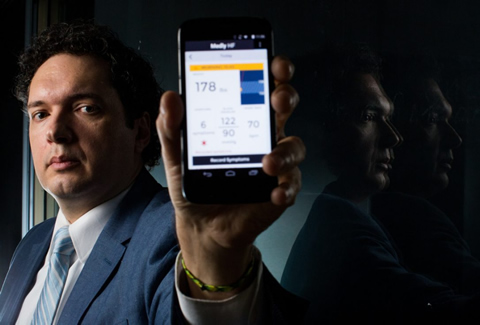Dr. Joseph Cafazzo, a U of T professor in engineering and health informatics, is working with clinicians at the Ted Rogers Centre for Heart Research on technology that allows doctors to monitor their heart patients’ progress at home.
The platform is a smartphone app called Medly that Cafazzo and his team are using to gain continuous, real-time readings of vital data about their patients’ health, such as blood pressure, weight, step count and heart rate. The app also allows patients to report symptoms such as swelling, dizziness and shortness of breath.
“Given the opportunity, patients have an immense capacity to care for themselves,” says Cafazzo, who leads the Centre for Global eHealth Innovation at the University Health Network. “Patients want to stay at home; they obviously don’t want to be hospitalized.”
A computer monitors the incoming data and alerts physicians when a patient’s readings fall outside stable parameters. “If we can detect changes in their status, we can intervene much earlier,” says Cafazzo – before the patient needs to be re-hospitalized.
Medly is still being evaluated but other remote monitoring programs have reduced rates of hospital admission for chronic heart failure by 21 per cent. At the same time as improving patient outcomes, this represents a huge potential savings for the health-care system.
Medly works in conjunction with Bluetooth-enabled devices such as weight scales and blood pressure monitors. It also works with the Apple Watch and Fitbit, which can track heart rate, heart rate variability, activity, calories burned and sleep. “If a patient is doing well, then their step count is probably near normal levels. If we’re seeing our heart failure patients only getting a couple of hundred steps a day, this could indicate a problem,” says Cafazzo.
“We’re just scratching the surface,” he adds. “Technology is going to change how we deliver health care. We’re on the cusp of something transformational.”





